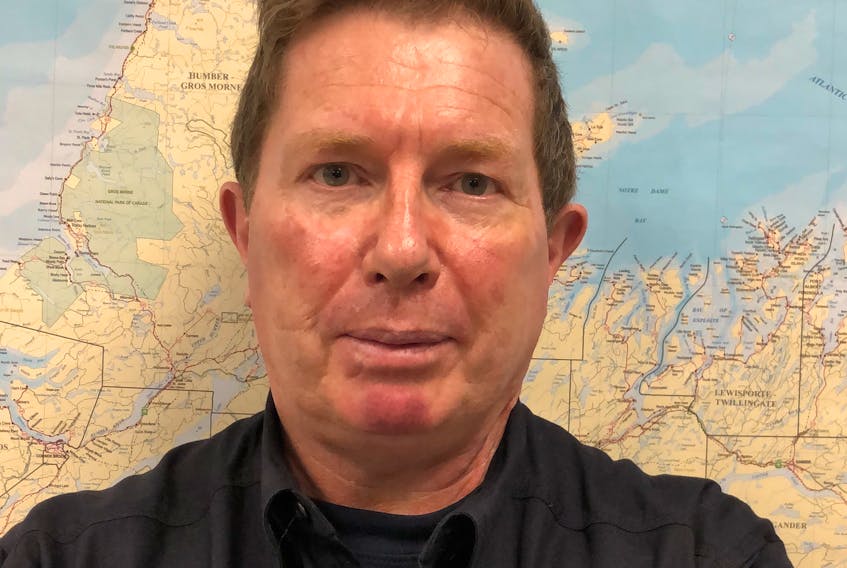Since it legally hit the shelves Oct. 17, one of the top cannabis concerns has been impaired driving.
With testing technology still under scrutiny if indeed it is available at all, The Central Voice took a look at what resources there are to tackle cannabis-impaired driving in central Newfoundland.
For Tracey Moller, president of MADD (Mothers Against Drunk Driving) Gander and area chapter, she suspects that many of the rural communities of Canada may not be as well-equipped as major city centres.
“I personally felt that when it was brought out legalized, in smaller towns and areas, the resources police have to work with are limited,” Moller said. “My hat is off to the RCMP and people who police and are out there fighting this — they do the best they can with the resources they get.”
Const. Duncan McRae is a drug recognition evaluator (DRE) for the RCMP, working across the central area in communities like Gander, New-Wes-Valley, Carmanville, Lewisporte, Twillingate, Grand Falls-Windsor and beyond. With such a wide coverage area, McRae recalled a recent incident where the distance of travel may have played a factor in his evaluation.
“From what the officer had observed, he concluded that this driver was impaired by cannabis. The driver also admitted to smoking cannabis earlier that day,” said McRae. “Because of where I happened to be at the time, it took me an hour and a half to get to the station. By the time I did the evaluation I came to the conclusion that he was not impaired by cannabis. But when my partner had pulled him over and I listened to exactly what he witnessed, I would have also come to the conclusion that this driver was impaired.
“Because it took me an hour and a half (to get there), that impairment had left his system. Hence, I did not have the legal grounds to demand a urine sample.”
“Personally, I’d love to see everyone receive this drug recognition training, and I’m sure RCMP wish the same.”
-Tracey Moller
In an emailed response, the RCMP stated there are 16 trained DRE officers within RCMP jurisdictions. While the RCMP would not disclose how many are in each region, they did confirm they are spread throughout the province.
McRae confirmed there are DRE officers in all areas, and who gets called to the scene depends on who is on duty and who is most readily available.
“We’ve got a good number in this province and we want to hold that close to our chest,” said McRae. “For us, we’re spread out a bit more but we make sure there’s always someone available.”
With the delayed response time that can occur in rural locations, Moller hopes that areas like central Newfoundland can access the same resources as cities like St. John’s.
“In these bigger cities I’m sure getting called to the scene is less of an obstacle with more drug recognition specialists in the area,” Moller said. “Personally, I’d love to see everyone receive this drug recognition training, and I’m sure RCMP wish the same.”
The protocol
When RCMP have pulled over a driver suspected of being impaired by a drug, officers with DRE training like McRae are called on. The officers then meet at the nearest detachment to further evaluate the driver and the nature of their impairment.
McRae says that if the person is impaired by alcohol, even if other drugs are suspected to be involved, the RCMP go ahead with alcohol charges.

“If I’ve stopped someone on the side of the road, I can smell cannabis and they admit to me they smoked a joint an hour ago, but I administer the test and they test positive for alcohol, that’s what we move forward on with the charges,” he said. “It’s only once we’ve ruled out alcohol as the source of impairment that we move to the drug recognition evaluation.”
When brought to a detachment, the DRE officer interviews the officer who pulled the driver over and why they suspect the person is impaired by drug-use.
When he moves on to evaluating the driver, McRae brings out a medical kit to examine the driver’s pupils, check their pulse, measure their blood pressure and internal temperature. He says the gaze, size and whether or not pupils converge can be a clear indicator of drug impairment.
If the DRE officer comes to the conclusion that the driver is clearly impaired, they can demand a urine sample. Similar to the breathalyzer test for alcohol, the driver can be charged with refusal if they deny this urine sample.
Cannabis criteria and ambiguity
The urine sample taken from the evaluation can come with its share of delays.
A recent drug evaluation by McRae in late December of 2018 resulted in a urine sample. Once McRae’s document on his evaluation and why he requested the sample was approved, the sample was then sent to Ottawa for testing. When he heard back from the lab testing the sample, McRae says he was told to expect the result in 155 days.
However, McRae says the time for receiving these test results can vary, and it is often dependent on the number of samples the lab is dealing with at a given time. He also stresses that the results will be in before the case is taken to court.
“The evidence will arrive in time for both the Crown and the defense to take a look at it,” said McRae. “The person who I’ve determined that their ability to drive was impaired by cannabis has their initial preliminary hearing, and if they plead not guilty, the court date set for that is never going to be within 150 days anyway.”
“Saliva is going to be the likely indicator for the roadside devices that will come online sometime in the future. I’d be surprised if there’s nothing on the road here in Newfoundland before the end of 2019."
-Const. Duncan McRae
According to the RCMP, the urine sample would have to contain evidence of cannabis consumption, but the impairment caused by cannabis is determined by the evidence of the DRE officer in their evaluation. There is no minimum level of cannabis in the urine sample that determines impairment.
Also, the RCMP does not provide a time frame for when it would be safe for people who have consumed cannabis to drive afterward.
“A large number of factors are at play including physical size of a person, tolerance, metabolism/elimination of the drug in their body,” the email stated. “A person must ensure they have given themselves enough time to ensure that they are sober when getting behind the wheel of a vehicle.”
As reported previously in The Telegram, MADD Canada president Patricia Hynes-Coates recommends that people do not drive within four hours of having smoked marijuana.
A technology to test for cannabis-use by saliva is currently in development, and McRae says this technology may very likely be in the hands of the province’s RCMP officers before the year is out.
“Saliva is going to be the likely indicator for the roadside devices that will come online sometime in the future,” he said. “I’d be surprised if there’s nothing on the road here in Newfoundland before the end of 2019.
“But we don’t want to start off on the wrong foot, we want to make sure that before they’re put on the road they pass our own test.”
In an emailed response from the Department of Justice and Public Safety, the department confirmed that an oral fluid drug testing device has been approved by the federal government and they are awaiting its deployment in the province. The Canadian government approved of this device in September last year, but the department did not give a timeline for when these devices will be used in Newfoundland and Labrador.
Charges

On Dec. 30, 2018, Glovertown RCMP arrested a Newtown man on drug impaired driving charges that resulted in a suspension of his license. In 2018 three other drug impaired driving charges were made in Holyrood and one in Clarenville.
McRae says he has personally experienced an increase in calls for drivers suspected to be impaired by cannabis since legalization, but this may not be the case across the board.
Spreading awareness
Moller has been involved with MADD for over six years, and her chapter has been a part of assemblies and meetings in Gander, Glenwood, Glovertown, Twillingate and other areas.
In this new time with a new legalized intoxicant on the market, she stresses that no matter the police resources available, their message of spreading awareness and caution around impaired driving remains vital as ever.
“Being something new, we’ve had to increase our work to spread awareness around cannabis and impaired driving,” she said. “I cannot beg people enough, whether it’s alcohol, cannabis, over the counter drugs – do not drive impaired. It can have major consequences on somebody’s life, and it may not be your own.”
[email protected]









